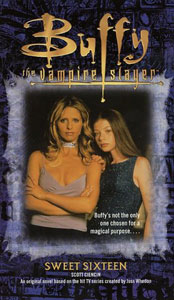In his debut Buffverse novel, the young-adult entry “Sweet Sixteen” (April 2002), veteran fantasy writer Scott Ciencin seems to make a smart call by focusing on the often-underused Dawn. But after a solid start where Dawn befriends picked-on new girl Arianna, the plot is driven by misunderstandings, manipulations and contrivances. Arguably worse, most of the Scooby Gang is out of character. The book never coalesces into a satisfying whole, and even good tidbits are few and far between.
I like how Dawn coming to the aid of Arianna – for whom the softer side of Sears would be a step up in the fashion department – parallels Buffy being drawn to the “loser” Willow when she arrives in Sunnydale. It nicely illustrates Dawn’s innate goodness. Arianna, whom we learn is a half-demon like “Angel’s” Doyle, has potential as a foil for what Buffy went through when she learned she was the Slayer. Arianna’s monstrous demon form gives her power to do good or evil.
Arianna is caught between her human mother, a stereotypical deadbeat, and her demon father, who comes from a fantasy-novel-type world – which feels slightly out of place but does fit with a saga that had introduced Lorne’s dimension on “Angel” by this point. Her father is the manipulator, promising she’ll receive her birthright as “the Reaver” if she follows his directions, and poisoning her mind against Buffy. For some reason, the author introduces the fact that Arianna can read people’s feelings. So at any point during her internal debate, she could’ve just read Buffy’s feelings and known she was good – but she doesn’t. It’s frustrating.
One positive is that I didn’t know how “Sweet Sixteen” would end, since Arianna’s thoughts about what path she should take bounce all over the place, sometimes in the span of a mere page. As noted, Dawn is in good form, but she disappears from the narrative at a time when she could’ve been a crucial positive voice for Arianna to hear, and this ends up not being as much of a Dawn novel as I hoped.
As a Slayer, Buffy is in fine form; after one fight, Ciencin describes her being so beaten and patched up that I imagined Painkiller Jane. As a person, she’s a little off base, as is Giles. Dawn brings them books on parental abuse, having guessed what’s up with Arianna’s home life. Giles and Buffy read some of the chapters as if they’ve never heard of such a concept. I know “Sweet Sixteen” is aimed at the youngest theoretical “Buffy” fans, but there are better approaches to youth fiction than artificially infantilizing the adults.
Everyone else way is off base. The worst offender is Spike, who drums up a game where extra-dimensional demons attack the Slayer and try to rack up points, somewhat in the style of SlayerFest ’98 from “Homecoming” (3.5). His bizarre idea is that Buffy needs to kill some demons to get back on her game. There’s no way Spike would purposely put Buffy in danger, even if it’s minor, at this point in the timeline when she’s reeling from her mother’s death. I squeeze “Sweet Sixteen” between “Forever” (5.17), the epilogue to Joyce’s death, and “Intervention” (5.18), when Spike doesn’t give up Dawn while being tortured by Glory, something that forever changes Buffy’s view of him.
Xander, Anya, Willow and Tara are out of character simply because they are in the background of scenes in the Magic Box but rarely talk. I understand that Ciencin wants to focus on Buffy and Dawn, but having their friends stand around quietly doesn’t fit with the long-established rhythms of “Buffy” stories.
A better approach might’ve been to have Buffy overly lean into the idea that she needs to be a mom to Dawn and purposely shut out her friends, trying to do her parenting away from them. Another option would be to tell this story in a tight time window and have the other Scoobies busy with other things during these events. The author takes the opposite tack, having Arianna repeatedly cycle through her options and padding out the events without much reason other than to make the book a certain thickness.
Dawn’s best friend at the start of “Sweet Sixteen” is Melissa, and by the end Dawn is besties with Arianna – “now and forever,” the author writes. Neither Melissa nor Arianna ever appear in the TV series, nor in any other spinoff fiction, as far as I know. Like so much of the novel, even its strongest aspect – a window into Dawn’s social life – comes off as one author’s concept rather than a portrayal consistent with the wider saga.
Click here for an index of all of John’s “Buffy” and “Angel” reviews.


